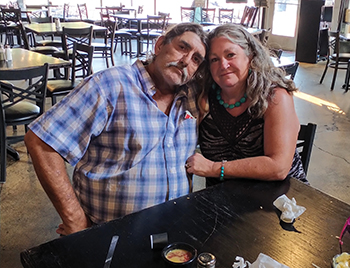A Caregiver's Perspective
When facing a liver cancer diagnosis...Lessons from Jimmy & Sharon

Helping her husband Jimmy through an aggressive case of hepatocellular carcinoma (HCC) led Sharon Dixon through uncharted territory. But one of the blessings of being his caregiver is that it positioned her to share what they learned with others who are now facing a possible liver cancer diagnosis.
Jimmy and I were friends for 30 years and married for 8. I miss him like hell every minute of every day. He once asked me, “If you’d known all of this was going to happen, would you still have married me?” I told him, “The worst day with you is still better than the best day with anyone else.”
My hope is that our story might better assist other families to avoid some of the issues we faced. Sharing what we learned helps me, and I hope it helps you, too.
Educate yourself. Find out about your condition and how your lifestyle choices could contribute to a better outcome. Jimmy’s HCC diagnosis was rooted in his lifestyle. His ethnicity was also a risk factor. He was Native American and grew up in an environment where he drank and smoked heavily. As a result, he had severe liver damage that led to cirrhosis. By the time he was in his 60s and married to me, the condition had progressed to liver cancer. Understand your risk factors for developing liver cancer. Be proactive about seeing your doctor and getting tested for certain liver conditions.
Find a liver specialist. HCC is so specialized that it really requires a doctor who is expertly trained to diagnose and treat it. If one is not nearby, ask for a referral from your doctor or a liver cancer advocacy group. We lived out in the country, and we didn’t have a liver specialist anywhere remotely close. It took a lot of time just to make an HCC diagnosis. Though we were fortunate to work with a great gastrointestinal doctor and interventional radiologist, we didn’t benefit from the knowledge of a liver cancer expert.
Take advantage of your resources. Right off the bat, ask to speak with the social worker or patient representative at your hospital. We had challenges paying for Jimmy’s care. It’s a vicious circle. When you can’t work because of your health, you can’t have insurance. And when you don’t have insurance, it can be next to impossible to get in with a doctor, let alone get the expensive tests and care you need. Our lives changed for the better once we met a social worker who took on the many barriers to care we faced.
Advocate for your loved one. Explore the treatments that are available and the side effects that accompany them so you are prepared if they happen. I didn’t know enough to really push for what we needed, and I didn’t know what to ask. Do your research, and ask lots of questions. The squeaky wheel gets the grease. As aggressive as HCC is, the speed with which you address any issue makes a difference.
Connect with the liver cancer community for information and support. After I got involved with Blue Faery: The Adrienne Wilson Liver Cancer Association and other organizations to help raise awareness about liver cancer and improve treatments, Jimmy joined me. The more he participated by being on advisory boards and giving interviews that shared his experiences as an HCC patient, the more he enjoyed it. He went from “They don’t want to hear from me” to “They like me!” He even won Blue Faery’s Adrienne Wilson Spirit Award for patients.
Consider palliative care. Jimmy reached the point where he wanted to stop active treatment and, instead, use the time God was giving him to make memories with me. We called in a faith-based, non-profit hospice group. Their goal was to use their palliative care services to help Jimmy have an enjoyable quality of life. What a wonderful move it was! Their nurses and chaplain were available to us in many ways, whether it was providing Jimmy medications as needed or offering emotional support.
We had one more year together, and we filled it with good memories. We bought a trailer and lived on a plot of land, worked in the garden together, even went out to dinner on New Year’s Eve and danced by ourselves in the Town Square to our song, “Tupelo Honey” by Van Morrison. Hospice had a wish fulfillment program, and Jimmy asked for something they hadn’t heard before: a wedding. We’d had a very small one, and this time he wanted to do it right. They coordinated it in our backyard, complete with decorations, flowers and a BBQ dinner.
Adopt the right attitude. Jimmy was an amazing man, always positive and never angry. His priorities were God, me, family and trying to inform cancer patients and their families. Find something that gives you hope.


